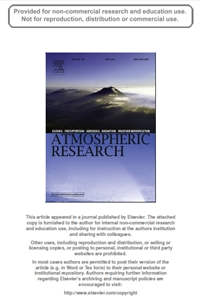
abstract
One of the expected consequences of an anthropogenically warmed climate is the increase in evaporation. Paradoxically, terrestrial observations across the world show that the rates of pan evaporation (Epan) have been steadily decreasing since 1950s. In this study, we present a trend in Thailand Epan based on quality controlled data from 28 weather stations from 1970 to 2007. Results indicated that, despite the annual mean air temperature increased by 0.91 °C over the past 38 years (0.024 °C per annum), the trend in annual Epan has steadily declined on average by ~7.7 mm a-2 (i.e. mm per annum per annum). By comparing, this change is larger than those previously reported for several countries. A further examination by Kendal's rank correlation and stepwise regression analysis based on some available weather data showed that reduction in wind speed and, to a lesser degree, sunshine duration were the likely causative meteorological factors affecting the Epan decrease in Thailand over the past 38 years. The findings of this study highlight local changes in aerodynamic and radiative drivers of the hydrological cycle, and their linkages to climate change could have important implications for Thailand's nature and society.
Atmospheric Research
journal homepage: www.elsevier.com/locate/atmos


































